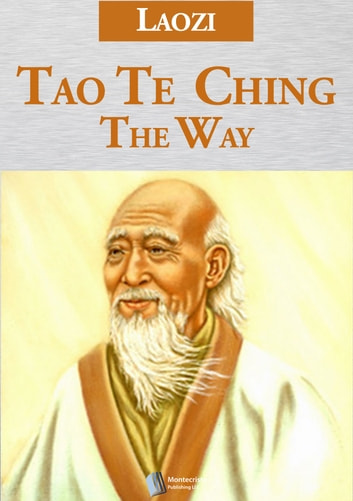Read this Post about Tao Te Ching by Laozi and download the free PDF below, on this website.
If you want to listen to it as an Audiobook you can click here below & watch the Video on Youtube!
Have a nice Time while Reading, and you can search for similar posts here on our Website if you are interested.
I. Introduction to the Tao Te Ching
The Tao Te Ching, attributed to the ancient Chinese philosopher Laozi, is a cornerstone of Taoist philosophy and one of the most translated works in world literature. Composed of 81 short chapters, this enigmatic text offers profound insights into the nature of the Tao (the Way) and the practice of Te (virtue). The Tao Te Ching’s poetic verses provide guidance on living in harmony with the natural world, embracing simplicity, and cultivating inner peace. Despite its brevity, the Tao Te Ching has influenced countless spiritual, philosophical, and political traditions across centuries.
At its core, the Tao Te Ching teaches the importance of yielding, humility, and the paradoxical power of non-action (wu wei). It encourages readers to let go of rigid desires and to flow with the rhythms of the universe. By aligning with the Tao, individuals can achieve a state of effortless existence and profound tranquility. The text’s enduring relevance speaks to its universal themes, which resonate with people seeking wisdom and balance in their lives.
- The Tao Te Ching is a foundational text of Taoist philosophy attributed to Laozi.
- Composed of 81 chapters, it offers guidance on living in harmony with the natural world.
- The text emphasizes simplicity, humility, and the power of non-action (wu wei).
- Despite its brevity, it has influenced numerous spiritual and philosophical traditions.
- Its universal themes resonate with those seeking wisdom and balance in life.
II. About Adiss Lombardo's Translation
Adiss Lombardo’s translation of the Tao Te Ching brings a fresh and accessible perspective to this ancient text. Lombardo is known for his ability to convey the subtle nuances and poetic beauty of Laozi’s words while maintaining the profound depth of the original teachings. His translation strives to make the Tao Te Ching understandable and relevant to contemporary readers, offering clarity without sacrificing the text’s inherent mysticism and philosophical complexity.
Lombardo’s approach highlights the Tao Te Ching’s timeless wisdom and its applicability to modern life. By presenting the text in a clear and concise manner, he enables readers to engage with its teachings more deeply. Lombardo’s translation is particularly valuable for those new to Taoist philosophy, as it provides an accessible entry point into the rich spiritual and ethical landscape of the Tao Te Ching.
- Adiss Lombardo’s translation brings clarity and accessibility to the Tao Te Ching.
- Lombardo preserves the poetic beauty and depth of Laozi’s original text.
- His translation makes the Tao Te Ching relevant to contemporary readers.
- It serves as an excellent entry point for those new to Taoist philosophy.
- Lombardo’s work highlights the text’s timeless wisdom and practical applications.
III. Historical Context and Significance of the Tao Te Ching
The Tao Te Ching was written during the Warring States period of ancient China, a time of great social and political turmoil. Amidst the chaos, Laozi’s teachings offered a vision of peace, harmony, and natural order. His emphasis on simplicity, humility, and non-violence stood in stark contrast to the prevalent attitudes of power and aggression. The text’s philosophical and spiritual insights provided a blueprint for personal and societal transformation, advocating for a return to a more harmonious way of living.
The significance of the Tao Te Ching extends beyond its historical context. It has profoundly influenced Chinese culture, philosophy, and religion, particularly through its contributions to Taoism, Confucianism, and even Buddhism. Over the centuries, the Tao Te Ching has been studied, interpreted, and revered by scholars and spiritual seekers around the world. Its teachings continue to inspire individuals to seek balance, cultivate virtue, and live in harmony with the natural world.
- Written during the Warring States period, the Tao Te Ching offered a vision of peace.
- Laozi’s teachings contrasted with the era’s prevalent attitudes of power and aggression.
- The text has profoundly influenced Chinese culture, philosophy, and religion.
- It contributed to the development of Taoism, Confucianism, and even Buddhism.
- The Tao Te Ching continues to inspire and guide seekers of wisdom worldwide.
IV. Key Philosophical Themes in the Tao Te Ching
The Tao Te Ching explores several key philosophical themes, central among them being the concept of the Tao, or the Way. The Tao is described as the ultimate reality, an indefinable force that underlies and unifies all things. Laozi teaches that living in accordance with the Tao involves embracing simplicity, spontaneity, and naturalness. By aligning with the Tao, individuals can experience greater harmony and fulfillment in their lives.
Another important theme is the principle of wu wei, often translated as “non-action” or “effortless action.” This concept advocates for actions that are in harmony with the natural flow of life, avoiding forceful or aggressive behavior. Wu wei emphasizes the power of yielding and adapting, suggesting that true strength lies in flexibility and humility. Additionally, the Tao Te Ching underscores the value of humility, compassion, and moderation, encouraging readers to cultivate these virtues in their daily lives.
- The Tao represents the ultimate reality and unifying force of all things.
- Wu wei, or “non-action,” emphasizes actions in harmony with the natural flow of life.
- The text values simplicity, spontaneity, and naturalness as paths to fulfillment.
- It teaches the importance of humility, compassion, and moderation.
- The Tao Te Ching guides readers towards inner peace and harmonious living.
V. Practical Wisdom and Everyday Applications
The Tao Te Ching offers practical wisdom that can be applied to various aspects of everyday life. Its teachings on simplicity and contentment encourage individuals to focus on what truly matters, letting go of unnecessary desires and distractions. By embracing a minimalist lifestyle, one can reduce stress and find greater peace and satisfaction. The text’s emphasis on humility and compassion also promotes harmonious relationships, fostering a sense of community and mutual respect.
In the realm of personal growth, the Tao Te Ching advises introspection and self-awareness. It encourages individuals to cultivate inner virtues and align their actions with the natural order. The principle of wu wei can be particularly transformative, guiding people to approach challenges with calmness and flexibility. By practicing non-resistance and adapting to the flow of circumstances, individuals can navigate life’s complexities with grace and effectiveness.
- Encourages simplicity and contentment, reducing stress and enhancing peace.
- Promotes humility and compassion for harmonious relationships and community.
- Advises introspection and self-awareness for personal growth.
- Teaches the principle of wu wei for navigating challenges with calmness and flexibility.
- Guides individuals to align actions with the natural order for a fulfilling life.
VI. The Impact of Taoism on Modern Thought
Taoism, deeply rooted in the teachings of the Tao Te Ching, has had a lasting impact on modern thought across various disciplines. In philosophy, it has influenced existentialism and phenomenology, particularly through its emphasis on direct experience and the fluid nature of reality. Taoist principles of balance and harmony have also found resonance in environmentalism, inspiring a holistic approach to ecology and sustainable living.
In the realm of psychology, concepts from the Tao Te Ching have informed practices such as mindfulness and stress reduction. The text’s emphasis on living in the present moment and embracing non-attachment aligns with contemporary therapeutic approaches. Moreover, Taoism’s influence extends to the arts, inspiring creative expressions that seek to capture the natural world’s beauty and spontaneity. The Tao Te Ching’s timeless wisdom continues to shape modern perspectives on life, wellness, and the interconnectedness of all things.
- Influenced existentialism and phenomenology with its focus on direct experience.
- Inspires environmentalism through principles of balance and harmony with nature.
- Informs mindfulness and stress reduction practices in modern psychology.
- Inspires artistic expressions capturing natural beauty and spontaneity.
- Continues to shape modern perspectives on life, wellness, and interconnectedness.
VII. Conclusion: Embracing the Teachings of the Tao Te Ching
In conclusion, the Tao Te Ching remains a vital source of spiritual and philosophical guidance. Its teachings on the Tao, wu wei, and inner virtue offer timeless wisdom for navigating the complexities of modern life. Adiss Lombardo’s translation brings fresh clarity to Laozi’s ancient words, making them accessible and relevant to contemporary readers. By embracing the principles outlined in the Tao Te Ching, individuals can cultivate a more harmonious and fulfilling existence.
The enduring legacy of the Tao Te Ching lies in its universal themes and profound insights. It invites readers to reflect on their own lives and to seek a deeper connection with the natural world. As we continue to face challenges in our personal and collective journeys, the Tao Te Ching offers a beacon of light, guiding us towards a path of simplicity, balance, and inner peace. By integrating its teachings into our daily lives, we can achieve greater harmony and alignment with the Tao.
- The Tao Te Ching offers timeless guidance for modern life’s complexities.
- Adiss Lombardo’s translation makes Laozi’s wisdom accessible to contemporary readers.
- Embracing its principles can lead to a more harmonious and fulfilling existence.
- The text’s universal themes invite deeper reflection on life and nature.
- Integrating its teachings fosters greater harmony and alignment with the Tao.
Feel free to search for other Scriptures, Texts or Books on our Page. You can also find articles to expand your Knowledge of Word and Writing.






